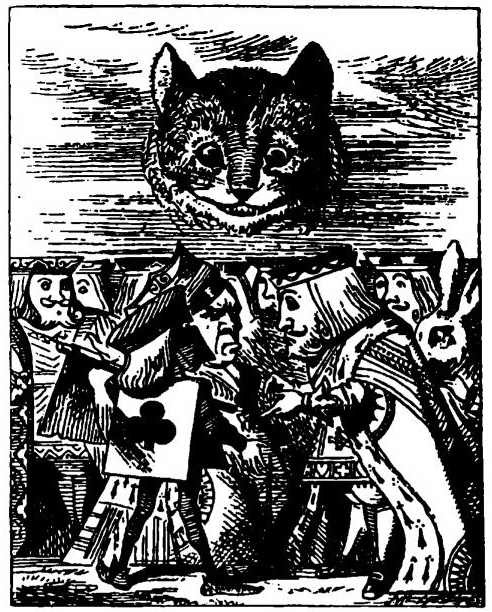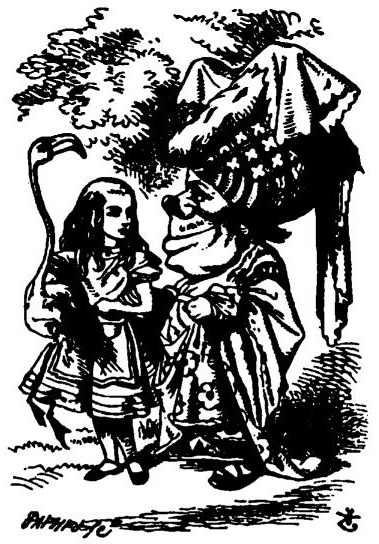
'Well, it must be removed, said the King very decidedly, and he called the Queen, who was passing at the moment, 'My dear! I wish you would have this cat removed!’
The Queen had only one way of settling all difficulties, great or small. 'Off with his head!’ she said, without even looking round.
'I'll fetch the executioner myself, said the King eagerly, and he hurried off.
Alice thought she might as well go back, and see how the game was going on, as she heard the Queen's voice in the distance, screaming with passion. She had already heard her sentence three of the players to be executed for having missed their turns, and she did not like the look of things at all, as the game was in such confusion that she never knew whether it was her turn or not. So she went in search of her hedgehog.
The hedgehog was engaged in a fight with another hedgehog, which seemed to Alice an excellent opportunity for croqueting one of them with the other: the only difficulty was, that her flamingo was gone across to the other side of the garden, where Alice could see it trying in a helpless sort of way to fly up into a tree.
By the time she had caught the flamingo and brought it back, the fight was over, and both the hedgehogs were out of sight: 'but it doesn't matter much, thought Alice, 'as all the arches are gone from this side of the ground. So she tucked it away under her arm, that it might not escape again, and went back for a little more conversation with her friend.
When she got back to the Cheshire Cat, she was surprised to find quite a large crowd collected round it: there was a dispute going on between the executioner, the King, and the Queen, who were all talking at once, while all the rest were quite silent, and looked very uncomfortable.
The moment Alice appeared, she was appealed to by all three to settle the question, and they repeated their arguments to her, though, as they all spoke at once, she found it very hard indeed to make out exactly what they said.
The executioner's argument was, that you couldn't cut off a head unless there was a body to cut it off from: that he had never had to do such a thing before, and he wasn't going to begin at his time of life.[81]
The King's argument was, that anything that had a head could be beheaded, and that you weren't to talk nonsense.
The Queen's argument was, that if something wasn't done about it in less than no time she'd have everybody executed, all round. (It was this last remark that had made the whole party look so grave and anxious.)

Alice could think of nothing else to say but 'It belongs to the Duchess: you'd better ask her about it.
'She's in prison, the Queen said to the executioner: 'fetch her here. And the executioner went off like an arrow.
The Cat's head began fading away the moment he was gone, and, by the time he had come back with the Dutchess, it had entirely disappeared; so the King and the executioner ran wildly up and down looking for it, while the rest of the party went back to the game.
IX. The Mock Turtle's Story
'You can't think how glad I am to see you again, you dear old thing!’ said the Duchess, as she tucked her arm affectionately into Alice 's, and they walked off together.
Alice was very glad to find her in such a pleasant temper, and thought to herself that perhaps it was only the pepper that had made her so savage when they met in the kitchen.
'When I'm a Duchess, she said to herself, (not in a very hopeful tone though), 'I won't have any pepper in my kitchen at all. Soup does very well without — Maybe it's always pepper that makes people hot-tempered, she went on, very much pleased at having found out a new kind of rule, 'and vinegar that makes them sour-and camomile that makes them bitter-and-and barley-sugar and such things that make children sweet-tempered. I only wish people knew that: then they wouldn't be so stingy about it, you know —[82]
She had quite forgotten the Duchess by this time, and was a little startled when she heard her voice close to her ear. 'You're thinking about something, my dear, and that makes you forget to talk. I can't tell you just now what the moral of that is, but I shall remember it in a bit.
'Perhaps it hasn't one, Alice ventured to remark.
'Tut, tut, child!’ said the Duchess. 'Everything's got a moral,[83] if only you can find it'. And she squeezed herself up closer to Alice 's side as she spoke.
Alice did not much like keeping so close to her: first, because the Duchess was VERY ugly; and secondly, because she was exactly the right height to rest her chin upon Alice 's shoulder, and it was an uncomfortably sharp chin. However, she did not like to be rude, so she bore it as well as she could.
'The game's going on rather better now, she said, by way of keeping up the conversation a little.
'Tis so, said the Duchess: 'and the moral of that is — 'Oh, 'tis love, 'tis love, that makes the world go round![84]
'Somebody said, Alice whispered, 'that it's done by everybody minding their own business!’[85]
'Ah, well! It means much the same thing, said the Duchess, digging her sharp little chin into Alice 's shoulder as she added, 'and the moral of that is — 'Take care of the sense, and the sounds will take care of themselves'.[86]
'How fond she is of finding morals in things!’ Alice thought to herself.
'I dare say you're wondering why I don't put my arm round your waist, the Duchess said after a pause: 'the reason is, that I'm doubtful about the temper of your flamingo. Shall I try the experiment?’
'He might bite', Alice cautiously replied, not feeling at all anxious to have the experiment tried.
'Very true', said the Duchess: 'flamingoes and mustard both bite.[87] And the moral of that is — «Birds of a feather flock together».
'Only mustard isn't a bird, Alice remarked.
'Right, as usual, said the Duchess: 'what a clear way you have of putting things!’
'It's a mineral, I think, said Alice.
'Of course it is, said the Duchess, who seemed ready to agree to everything that Alice said; ’there's a large mustard-mine near here. And the moral of that is — 'The more there is of mine, the less there is of yours'.[88]
'Oh, I know!’ exclaimed Alice, who had not attended to this last remark, 'it's a vegetable. It doesn't look like one, but it is.
'I quite agree with you, said the Duchess; ’and the moral of that is — 'Be what you would seem to be' — or if you'd like it put more simply — 'Never imagine yourself not to be otherwise than what it might appear to others that what you were or might have been was not otherwise than what you had been would have appeared to them to be otherwise.
'I think I should understand that better, Alice said very politely, 'if I had it written down: but I can't quite follow it as you say it.
'That's nothing to what I could say if I chose, the Duchess replied, in a pleased tone.
'Pray don't trouble yourself to say it any longer than that, said Alice.
'Oh, don't talk about trouble!’ said the Duchess. 'I make you a present of everything I've said as yet.
'A cheap sort of present!’ thought Alice. 'I'm glad they don't give birthday presents like that!’ But she did not venture to say it out loud.
81
The executioner’s argument was, that you couldn’t cut off a head unless there was a body to cut it off from… — в этом рассуждении Кэрролл строго «логичен» — если не считать того, что в начале строго рационального спора лежит иррациональный факт (голова Чеширского кота, парящая в воздухе).
82
«Maybe it’s always pepper that makes people hot-tempered… and vinegar that makes them sour — and camomile that makes them bitter — and — and barleysugar and such things that make children sweet-tempered.» — в данном отрывке Кэрролл играет на прямом и переносном значениях прилагательных: «hot» («острый, крепкий») и «hot» или «hot-tempered» («вспыльчивый») и т. д. «Camomile» — горький настой ромашки, которым широко пользовались для лечения различных болезней в викторианской Англии.
83
«Everything’s got a moral, if only you can find it» — Стоит ли отмечать, что в речах Герцогини, стремящейся во всем увидеть свою мораль, слышится пародия на современные Кэрроллу дидактические сочинения для юношества?
84
‘Oh, ’tis love, ’tis love, that makes the world go round!’ — последняя строка Дантова «Рая», «безусловно, заимствованная из какого-то второсортного перевода», — замечает П. Хит. В переводе М. Лозинского она звучит так: «Любовь, что движет солнце и светила» (Песнь XXXIII, 145).
85
«Somebody said… it’s done by everybody minding their own business». — Алиса ссылается на слова самой Герцогини в главе VI.
86
‘Take care of the sense and the sounds will take care of themselves.’ — Герцогиня, разумеется, перевирает все пословицы или просто придумывает их заново. В данном случае, однако, она переиначивает английскую пословицу: «Take саге of the репсе and the pounds will take care of themselves». М. Гарднер, приведя ее в своем комментарии для американских читателей, прибавляет, продолжая кэрроллианскую игру: «The Dutchess’s remark is sometimes quoted as a good rule to follow in writing prose or even poetry. Unsound, of course.»
87
flamingoes and mustard both bite — глагол «bite» в данном случае употребляется в двух значениях: «кусаться», «щипаться» (о фламинго) и «щипать» (о горчице).
88
«there’s a large mustard-mine near here. And the moral of that is — ‘The more there is of mine, the less there is of yours’». — Кэрролл реализует омонимию слова «minе»: это и сущ. «шахта» и абсолютная форма притяжательного местоимения «мой».